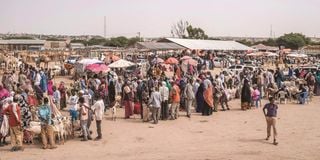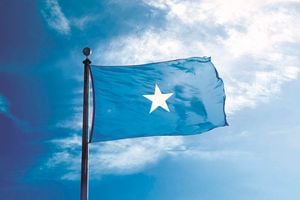
People trade during a livestock market in the city of Hargeisa, Somaliland, on September 15, 2021.
Somali politicians are seeing a tiff between their country and Ethiopia as an advantage for personal elevation, even though there has been no succinct solution on the future of the breakaway region of Somaliland.
Ever since Ethiopia reached a controversial MoU with Somaliland in January, reportedly to offer a coastal strip to Addis Ababa in exchange for recognition, Somali politicians, including those who had vanished in political contests, returned to criticise. But they also spoke about their ambitions and those of the movements they lead.
Abshir Aden Ferro, for example, the Chairman of the Alliance for the Future Party, last week targeted Ethiopian Prime Minister Abiy Ahmed whom he accused of intensifying divisions within the region, to cover up for his leadership shortcomings.
By sticking to the controversial MoU, Ferro argued, Dr Abiy had transformed what was once an internal matter into a “broader geopolitical issue to cover his previous failures.”
“His aggressive stance on port access has damaged relationships with neighbouring countries, which were previously based on cooperation and mutual respect,” he said, indicating this has further attracted external powers like Egypt who have their own agenda to settle.
“This shift highlights the growing complexity of the situation, raising serious concerns that regional instability could draw in additional international actors."
Ethiopia, however, insists it wants to build good ties with neighbours. Foreign Minister Taye Atske-Selassie, told a news conference on Friday, August 30, that his country is for peaceful resolution of differences but still warned, “Ethiopia cannot remain silent as the peace and harmony of its neighbours are turned into a playground for terrorists and anti-peace elements” and what he called “collaboration with hostile forces as shortsighted and counterproductive.”
In Somalia, a perceived bid to dismember its parts often unites even political rivals. But they often also use the opportunity to criticise those in power for failing to tame the problem. Opponents of President Hassan Sheikh Mohamud, for example, have used the MoU to lay into his weakness to defend the country’s sovereignty.
In fairness, however, President Mohamud has been a vocal critic of the MoU too. On January 2, he addressed the bicameral parliament in reaction to the MoU signed by Prime Minister Abiy Ahmed and Somaliland leader Muse Bihi.
“Somalia and Ethiopia shared a checkered history, full of hostilities, in the past. I believed that in recent years we closed that nasty page and turned a new one,” he told the legislators in Mogadishu.
“The MoU signed (January 1) is a blatant aggression against our unity and sovereignty,” said Mohamud.
For politicians in Somalia, Ethiopia’s move represents its intent to weaken the neighbour. And that is a galvanising issue to rally the nation, both online and in political circles.
Abdirahman Abdishakur, an MP in Somalia was categorical: “To resolve this situation, it is crucial for Ethiopia to first withdraw the Memorandum of Understanding (MoU) and clearly affirm its respect for Somalia's sovereignty and territorial integrity.”
In the past, he landed in hot soup. As Planning Minister in the Transitional Federal Government of Somalia (TFG), he had signed a controversial MoU with Kenya to delimit their maritime boundary, through the UN. Somalia’s transitional federal parliament, however, rejected the MoU in 2009.
Mogadishu, then under President Mohamud’s first term, sued Kenya at the International Court of Justice. It won most of the claims, although the Court offered an alternative line cutting through each of the country’s original territorial demands.
That signature though would hurt his presidential ambitions, twice, as opponents raised it often when he contested. He learnt his lesson, and won’t back down on Ethiopia.
“Ethiopia should acknowledge that Somaliland is an integral part of Somalia and adhere to international law and diplomatic norms by engaging with the federal government in all diplomatic relations.
“By taking these steps, Somalia does not object to Ethiopia having commercial access, which refers to non-sovereign access that allows landlocked countries to utilise a coastal state's sea for transit and trade without gaining control over the territory.”
Yet a solution for the future of Somaliland is not what Somalis would discuss at the moment. Somaliland announced secession from Somalia in 1991, following the fall of Siad Barre’s regime in Mogadishu. But no sovereign state recognises the region as independent yet. Originally known as British Somaliland, the region had united with Italian Somaliland, as southern Somalia was known before independence, to form the Somali Republic in 1960.
Somaliland argues that the union broke down in 1991 but Somalia refuses to let go. The African Union passed the ball back to Somalis to settle it and the status quo seems to benefit Mogadishu as it keeps all its corners intact. The MoU was signed just as Djibouti was preparing to mediate between Mogadishu and Hargeisa on their future. The talks were halted indefinitely.
“Our situation is marked by a sharp division in global opinions. While some international voices support Somaliland’s sovereignty and acknowledge its progress, others are intent on undermining it,” said a statement from the Somaliland Ministry of Foreign Affairs. Only Taiwan recognises Somaliland, actually. And Taiwan itself is a part of China in spite of seeking to secede.
“These critics often unfairly compare Somaliland to the failed state of Somalia, underestimating our achievements and expecting us to be weaker. Yet, Somaliland continues to defy these expectations through its remarkable resilience.”
Somaliland have marketed the MoU as a possible crack in the ceiling. This week, Ethiopia’s Consul General Teshome Shunde presented credentials to Bihi, where he also discussed “regional security, economic cooperation and strengthening ties between our two nations,” according to a dispatch from Bihi’s office. Somaliland officials, however, incorrectly labelled the Ethiopian diplomat as “Ethiopian Ambassador.”
“This formal ceremony marks a significant step in furthering the diplomatic ties between Somaliland and Ethiopia, reinforcing both our commitments to cooperation and mutual respect,” said Rhoda J Elmi, Deputy Minister for Foreign Affairs in Somaliland.
“His appointment comes at a pivotal time when the strong bilateral relations between our two sisterly nations continue to grow.”
On most recent issues, Somaliland has sided with Ethiopia. When Addis Ababa criticised Egypt’s deployment of arms to Somalia last week, Somaliland issued a statement to “strongly object” to Egyptian presence in Somalia too.
“Given the history of such deployments, the lack of assessment or consideration for the stability and security of Somalia and the entire Horn of Africa region is concerning,” said a statement from the Somaliland Ministry of Foreign Affairs. Somalia insists it has a right to decide who its partners are within defence cooperation.








